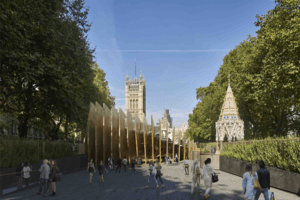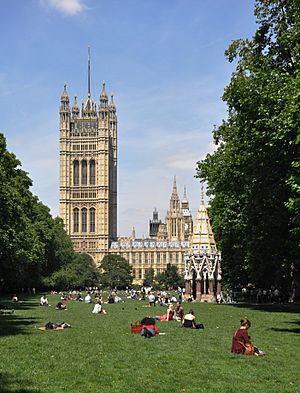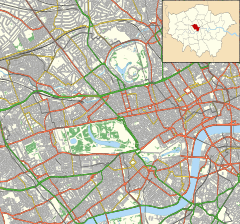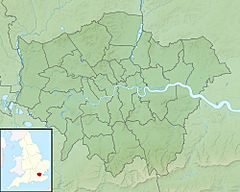UK Holocaust Memorial facts for kids
The UK Holocaust Memorial is a proposed memorial and learning centre, intended to preserve the testimony of British Holocaust survivors and concentration camp liberators, and to honour the Jewish victims of the Holocaust and other victims of Nazi persecution, including Roma, LGBT, and disabled people.
It is currently planned to be built in Victoria Tower Gardens, a Royal Park next to the Houses of Parliament. The proposal has become contentious because of the popularity and nature of the location and because the memorial would take around a quarter of the green space in the park.
Contents
Holocaust Commission
| Location | London, United Kingdom |
|---|---|
| Coordinates | 51°29′45″N 0°07′29″W / 51.49586°N 0.12481°WCoordinates: 51°29′45″N 0°07′29″W / 51.49586°N 0.12481°W |
| Type | memorial |
In January 2014 UK Prime Minister David Cameron tasked a Holocaust Commission with establishing what more Britain could do to preserve the memory of the Holocaust and ensure that the lessons it teaches are never forgotten. The Commission ran a national call for evidence. There were nearly 2,500 responses. This included one of Britain’s largest ever gatherings of Holocaust survivors at Wembley Stadium. The Holocaust Commission report was produced in 2015. It concluded:
- There is widespread dissatisfaction with the current national memorial in Hyde Park
- Effective Holocaust education fails to reach significant numbers of young people
- There is inadequate support for regional projects compounded by a lack of long-term funding for Holocaust education
- The testimony of survivors and liberators needs to be urgently recorded and appropriately preserved
and recommended:
- A striking and prominent new National Memorial
- A World-Class Learning Centre at the heart of a campus driving a network of national educational activity
- An endowment fund to secure the long-term future of Holocaust Education including the new Learning Centre and projects across the country
- An urgent programme to record and preserve the testimony of British Holocaust survivors and liberators
UK Holocaust Memorial Foundation
The report proposed the creation of a new body to take forward the programme on survivor testimony, secure the money needed to deliver these recommendations and identify a prominent location for a new National Memorial and Learning Centre. Consequently, the UK Holocaust Memorial Foundation (UKHMF) [1] was formed to oversee the project.
The British government allocated £50 million (later increased to £75 million), to be supplemented by £25 million from charitable donations, to the UKHMF to support the construction of the memorial. Additional funding is being sought for the construction of the learning centre.
In September 2015 the UKHMF issued specifications for the Memorial and for the education and learning centre. In 2016 the UKHMF undertook a search of over fifty locations and, in July 2016, it was announced that Victoria Tower Gardens had been chosen for both the memorial and underground learning centre.
Memorial and Learning Centre
The learning centre is to be a facility giving visitors engaging experiences to learn about the Holocaust and subsequent genocides through a variety of mediums including historic photographs, film footage and audio recordings. Government support will supplement funds raised from visitor donations and other charitable contributions to cover the running costs of the Memorial and Learning Centre which, subject to planning permission, is expected to open in 2024.
On January 28, 2021, the Communities Secretary Robert Jenrick announced the government will provide free entry, in perpetuity, to everyone visiting the proposed centre. "Giving universal free access to the memorial puts the UK on the same footing as the most important monuments and museums and will reassure Holocaust survivors their testimony will be freely available to all when they are no longer able to tell the story themselves, forever," Jenrick said.
Architectural competition
An international competition was held for the design of the UK Holocaust Centre. In October 2017, it was announced that the competition was won by a team led by the British-Ghanaian architect David Adjaye (through Adjaye Associates), with Ron Arad Architects as Memorial Architect, and Gustafson Porter + Bowman as landscape architect. The design combines a memorial sculpture with an underground learning centre that will help to educate visitors about prejudice and discrimination. The Memorial consists of 23 bronze fins, with the gaps between the fins representing the 22 countries where the Holocaust destroyed Jewish communities, and acting as separate paths down to a hall named the 'Threshold' leading into the Learning Centre, along with a "contemplation court" and "hall of testimonies". A public consultation on the latest designs was held on 4–8 September 2018. Opponents to the construction of the memorial claim the design is linked to the Adjaye Associates' rejected Ottawa Holocaust Memorial application.
The lead architect of the project, David Adjaye, sparked rebuke from opponents by arguing that ‘disrupting’ the pleasure of being in a park is key to its thinking. David Aaronovich of the Times and the Observer's architecture critic Rowan Moore have discussed arguments against the park. The ensuing flurry of media attention brought to light some of the critical consultation submissions, such as that from Historic England. Furthermore, co-signed letters from politicians for and against the park have been published in the press. Notably, a group of Jewish members of the House of Lords co-signed a letter stating that the memorial 'evokes neither Holocaust nor Jewish history'. The latest letter was from 174 politicians who co-signed a statement in support of building the scheme. Sadiq Khan, the Mayor of London, has also voiced his concerns about the growing opposition.
"Calling in" the planning decision
Following a request by Lord Pickles and Ed Balls, the co-chairs of the UKHMF, to Robert Jenrick, the Secretary of State for Housing, Communities and Local Government, Esther McVay, the Minister for State for Housing, "called in" the application on 6 November 2019. A spokesman said, "A public inquiry will be held and overseen by an independent planning inspector. The Minister will make the final decision on the application taking into account the inspector’s recommendation."
A spokesman for Westminster Council said, following the calling in, "We’ve been clear to date that we would consider the scheme on its merits and in line with our planning policy." In February 2020, Westminster City Council's planning committee voted unanimously to reject the planning application, saying it contravenes planning rules on size, design and location.
Public inquiry
The inspector David Morgan BA MA MRTPI IHBC ran the inquiry from 6 October to 13 November 2020. Due to the ongoing COVID-19 restrictions, the inquiry was held as a virtual event; main parties and participants were invited to join via Microsoft Teams or Telephone. The inspector's report will be drafted and submitted to the Secretary of State on or before 30 April 2021. All inquiry documents are available at https://www.westminster.gov.uk/holocaust-memorial-inquiry-documents.
Opposition and concerns
Victoria Tower Gardens is a public park along the north bank of the River Thames in London. It is adjacent to the Victoria Tower, the south-western corner of the Palace of Westminster and extends southwards from the Palace to Lambeth Bridge, sandwiched between Millbank and the river. Victoria Tower Gardens is a Grade II* listed park created in 1864–70 following the embankment of the Thames. It is in a Conservation Area, is partly within the UNESCO World Heritage Site of Westminster, and is designated a zone of Monument Saturation.
The park is already home to three memorials that raise awareness of injustice, namely The Burghers of Calais, the Buxton Memorial Fountain and the Emmeline and Christabel Pankhurst Memorial. The project design team intends the project to be contextualised among these other memorials, but campaigners who oppose the destruction of parkland have objected that the Holocaust memorial is vastly different, in scale and nature, to the existing memorials.
The park is also home to a small children's playground and often plays host to temporary cultural events including the light installation spectra, by Japanese artist Ryoji Ikeda, which commemorated the centenary of the start of the First World War, and outdoor film screenings. It is cherished by many as a surprisingly peaceful green space in the heart of London.
The proposed construction was submitted for planning permission to Westminster City Council who would have to bear in mind their own rules on new monuments in this zone, the effect on heritage views of the Palace of Westminster and the Mayor of London's stated commitment to protect London's green spaces from development. The ministry took control of their own application. There is currently, October 2020, a public inquiry. The inspector has been told to limit his conclusions to a recommendation; he cannot rule against or for the application. As part of the planning process, Westminster city council launched a public consultation in regards to the memorial. Many authoritative bodies have replied. Several very critical comments by respected international and UK organisations sparked widespread media coverage in the British press. The official adviser to UNESCO on World Heritage Sites, ICOMOS, has objected to the Victoria Tower Gardens location saying the building would "interrupt substantially the key view of the Tower and Palace". It further says that two lines of trees may not survive the construction which "would have a massive visual impact." The Royal Parks, the body that administers many public parks in the UK, said in its planning objection that it "strongly supports" the principle of the project but believes its scale and design would have "significant harmful impacts" on the "character and function" of the park. The Environment Agency has raised concerns that the building could compromise flood defences crucial to local businesses and homes, saying: "The proposed development is likely to adversely affect the construction and stability of the flood defence [meaning that] surrounding areas will be highly susceptible to rapid inundation." Another aspect that was brought up by tree radar is that apart from roots, there may be a chance of striking unexploded munitions from World War II during the construction process, adding complexity to creating a memorial on this site. Lord Carlile, the former independent reviewer of terror laws, described the siting of the memorial on the same broad site as the Houses of Parliament as a "self-evident terrorism risk".
The grassroots campaign of local residents, ‘Save Victoria Tower Gardens’ is also active in bringing public attention to the arguments against placing the memorial in the currently proposed site. This campaign has launched a petition attracting over 10,000 signatures and has published letters to editors of major national newspapers. Meanwhile the UKHMF, which sponsors the project, has also been active in the press and in submitting consultation responses to the local council website: over 90% of responses to the consultation opposed the proposed development.
The government was criticised for influencing the results of the consultation by engaging a private company, Big Ideas, to communicate the planned design to the public and solicit responses to the consultation. The company focussed on contacting members of Jewish community groups, obtaining a large number of responses, all in favour of the plan in a generic manner with similar text, which the company then submitted to Westminster Council's consultation portal. An answer to a Parliamentary Question from 8 October 2019 showed that around £140,000 was spent by the government on private campaigning companies, in addition to its ongoing funding of the UKHMF. In November 2019, proponents of a memorial to the Transatlantic Slave Trade complained that ample public funding is provided to the UK Holocaust Memorial Foundation, “but not to us”.
Other UK Holocaust memorial sites
The Heritage Lottery Fund in 2018 and 2019 provided significant funding to open a Holocaust Education and Learning Centre in Huddersfield and to refresh and expand the Beth Shalom Holocaust Centre in Nottinghamshire. In August 2019, the Imperial War Museum announced plans to spend over £30m on a new set of galleries over two floors at its London site covering the Holocaust and its importance in World War II. The galleries are set to open in 2021 and will replace the existing permanent Holocaust exhibition.





